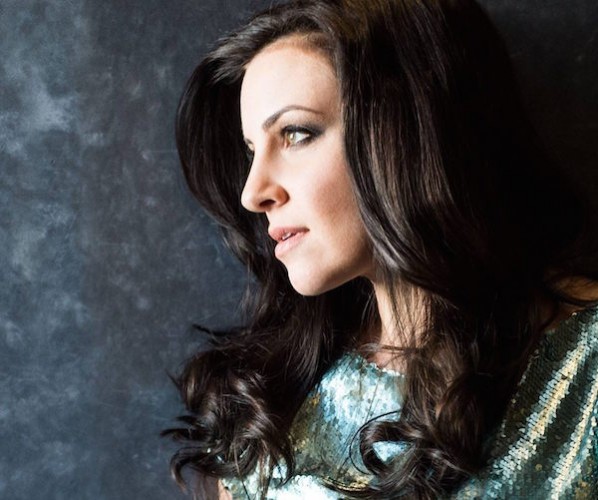Classical CD Reviews: Joyce El-Khoury’s “Echo” and Matt Haimovitz’s “Troika”
Soprano Joyce El-Khoury sings spectacularly in her new disc, Echo; cellist Matt Haimovitz and pianist Christopher O’Reily come up with an intriguing take on 20th-century Russian music.

Joyce El-Khoury’s new disc suggests that this is a singer who’s pretty much got it all.
By Jonathan Blumhofer
There’s much to love about soprano Joyce El-Khoury’s new disc, Echo, from Opera Rara.
For one, it’s spectacularly sung. El-Khoury has an exceptional voice, rich and warm but plenty nimble and packing lots of personality. She’s well-balanced in her tone, too: the big, high notes carry the same intensity as the low- and middle-range ones and her control over the volume of all of them is total. From a technical angle, then, El-Khoury’s a singer who’s pretty much got it all.
The album is also quite nicely programmed. An homage to the 19th-century diva Julie Dorus-Gras, El-Khoury tackles some familiar works (mostly excerpts from Lucia di Lammermoor and Guillaume Tell), but there’s more than a little Meyerbeer to go along with arias by Fromental Halévy, Ferdinand Hérold, and a snatch of Berlioz’s French-language arrangement of Weber’s Der Freischütz. These were all pieces with which Dorus-Gras was closely associated and, on the merits of this disc, one hopes El-Khoury will continue to champion them, too.
Perhaps the musical star of the album is Meyerbeer’s opera Robert le diable. El-Khoury sings three arias from it – “Robert, toi que j’aime,” “Va, dit-elle, va, mon enfant,” and “Quand je quittai la Normandie” – each of which demonstrate her vocal athleticism as much as her dramatic chops (which are formidable). Additionally, they serve to remind us that Meyerbeer’s gifts as a composer, despite Wagner’s vilification of him, were nothing to sneeze at.
The Donizetti movements, too – “Regnava nel silenzio” and “Lucia, perdona…” (the latter sung with tenor Michael Spyres) – showcase a voice of uncommon agility and musicianship. The duet is particularly special, with a sensitive blend of the voices both in dynamics and tone quality that emphasizes up the natural chemistry between the two singers. And the climax of that one, with El-Khoury and Spyres reaching for (and hitting) the stratosphere, is nothing short of thrilling.
The remaining selections, from Hérold’s Le Pré aux clercs, Halévy’s La Juive, and Berlioz’s Benvenuto Cellini, demonstrate similar vocal qualities from El-Khoury and showcases some of the remarkable breadth of French opera in the mid-19th-century.
Throughout, the Halle Orchestra and conductor Carlo Rizzi provide an energetic, often colorful accompaniment. There’s a sense of occasion to their playing and to El-Khoury’s singing that’s infectious and, above all, something one doesn’t encounter regularly in studio recordings.

Cellist Matt Haimovitz and pianist Christopher O’Reily take on 20th-century Russian music in Troika, their new album for Pentatone. Featuring sonatas by Rachmaninoff, Prokofiev, and Shostakovich, plus short pieces by those composers and covers of more recent songs, it paints an intriguing portrait.
Haimovitz’s reading of Shostakovich’s D-minor Cello Sonata is earnest and stern, perhaps to a fault. Yes, it’s played meticulously; the delirious second movement suggests stepping out of a dacha at two in the morning after one too many toasts, the searching Largo broods; and the finale cavorts, if not quite as ironically as it might, at least with more than a little spirit.
But the whole reading sometimes lacks urgency and momentum in the big movements. This isn’t the slowest performance of the Sonata on record (Yo-Yo Ma’s clocks in around thirty-two minutes; this one’s around twenty-nine. Rostropovich’s, for contrast, was a hair over twenty-five), but it sometimes feels longer than it should.
Haimovitz’s take on Prokofiev’s Sonata in C major tries to be less epic and succeeds better. Here, the cellist and pianist mine the music’s daffy humor while also turning in fresh, unpretentious accounts of the Sonata’s outer movements. The finale, in particular, is brilliantly fleet – like a blast of summer warm summer wind across a plain.
Perhaps the most wholly satisfying of the performances is their take on Rachmaninoff’s big Sonata in G minor. This is a bold, technicolor piece – in some ways more a chamber concerto than sonata – and it receives a suitably fiery reading from Haimovitz and O’Reily. The outer movements burn hot; the second-movement scherzo trips menacingly; and the slow third one, with its ambiguous major-minor shifts sings with warm passion.
All three sonatas are prefaced (in the case of the Rachmaninoff, followed) by a short piece from the same composer. Thus, there’s a rather woozy arrangement of the “Waltz” from Shostakovich’s Orchestral Suite no. 2, an intense adaptation of the “Troika” from the Lt. Kijé Suite, and an affectionate account of Rachmaninoff’s Vocalise to be found here, too.
Each ties in – in terms of tone and intensity, at least – to the set of covers (of Viktor Tsoi’s Kukushka, Pussy Riot’s “Punk Prayer – Virgin Mary, Put Putin Away,” and The Beatles’ “Back in the U.S.S.R.”) that fill out the disc. At the end of a long album, they’re maybe a bit superfluous. But, as a programming tack, they’re effective, drawing a straight line across more than a century’s worth of deeply expressive – sometimes furiously so – music by Russian (or Russian-inspired) composers.
Jonathan Blumhofer is a composer and violist who has been active in the greater Boston area since 2004. His music has received numerous awards and been performed by various ensembles, including the American Composers Orchestra, Kiev Philharmonic, Camerata Chicago, Xanthos Ensemble, and Juventas New Music Group. Since receiving his doctorate from Boston University in 2010, Jon has taught at Clark University, Worcester Polytechnic Institute, and online for the University of Phoenix, in addition to writing music criticism for the Worcester Telegram & Gazette.
Tagged: " Opera Rara, "Echo, Carlo Rizzi, Christopher O’Reily, Halle Orchestra, Joyce El-Khoury, Matt Haimovitz, Pentatone
